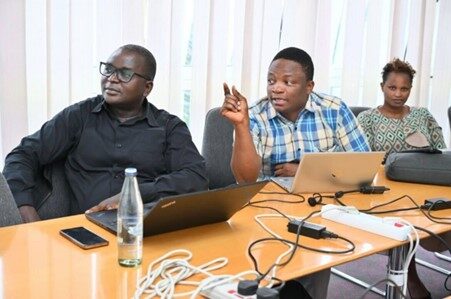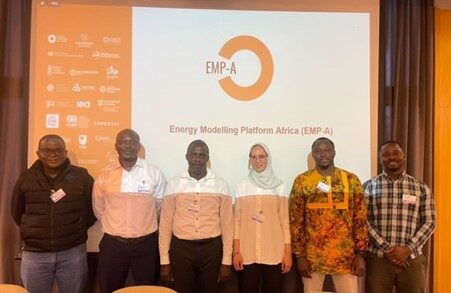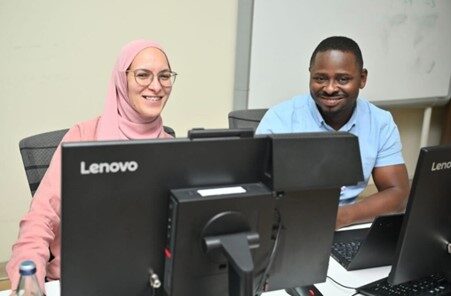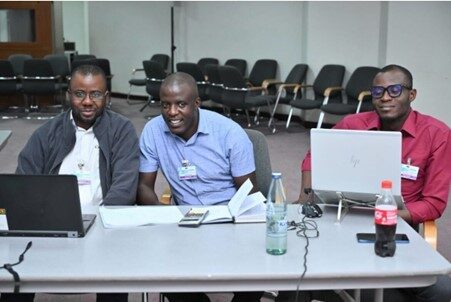Across the African continent, energy professionals are no longer just learning to model their countries’ energy systems—they’re becoming the next generation of educators. At the centre of this shift is the Energy Modelling Platform for Africa (EMP-A), which is scaling up its Train-the-Trainer programme to support a continent-wide, self-sustaining model of capacity building.

From Learners to Leaders: A New Generation of Trainers
At EMP-A 2025, held in Addis Ababa, six alumni returned – not as students, but as assistant trainers:
- Felix Yeboah (Ghana) – University of Energy and Natural Resources who first trained in OSeMOSYS at EMP-G 2021.
- Rakia Bouallegui (Tunisia) – University Lecturer and PhD researcher at Ecole Nationale d’Ingenieurs de Tunis who first trained in OSeMOSYS at EMP-G 2021.
- Thierry Odou (Benin) – Associate Officer at IRENA who returned as a trainer for OnSSET first trained in OSeMOSYS at EMP-A 2021.
- Bernard Ouma (Kenya) – National energy planner and University Lecturer at Taita Taveta University who first trained in CLEWs at EMP-A 2023 in Namibia.
- Mwansa Kaoma (Zambia) – Lecturer, researcher and consultant at the University of Zambia who first trained in MAED at EMP-A 2024 in Ghana.
- Kabwe Mubanga (Zambia) – Lecturer and researcher at the University of Zambia who first trained in OSeMOSYS at EMP-A 2024 in Ghana.
Each of them brought unique expertise, local knowledge, and a shared commitment to African-led energy planning.

Deepening Skills Through Teaching
The Train-the-Trainer track allows motivated alumni to return to EMP as assistant facilitators while progressing toward official certification. This includes earning digital badges that document core competencies such as:
- Mastery of open-source tools like OSeMOSYS and MAED
- Ability to debug and troubleshoot models in real time
- Skills in facilitation, group coordination, and instructional design
But for many, the real growth happens in the act of teaching.
“Teaching others forces you to see your own blind spots,” said Felix. “Helping students solve modelling issues pushed me to refine how I think and explain.”
Rakia reflected on her improved classroom presence:
“The first time I joined EMP-A, I was a bit hesitant. Now, as a trainer, I can anticipate student needs better—even when switching between languages during sessions.”
Thierry echoed the transformative power of tough questions:
“You realise how critical it is to tailor both the tools and the teaching to each country’s context. It’s how we build real, local capacity—not just follow templates.”

One Continent, Many Paths—One Shared Goal
Each trainer represents a different slice of Africa’s energy ecosystem:
- Felix moved from commercial tools to championing open-source modelling in Ghana.
- Rakia is applying OSeMOSYS in her doctoral work and introducing it to her postgraduate curriculum.
- Thierry is working across Africa in an international organization to help build independent, local modelling expertise.
- Bernard supports government planning efforts and mentors young modellers in Kenya.
Their journeys differ—but their goal is the same: Africa must own its energy future, and that starts with owning the knowledge.

What Comes Next? Scaling the Impact
Once fully certified, these trainers plan to:
- Launch or contribute to university-level courses on energy modelling
- Support government ministries, utilities, and national planning bodies
- Mentor new cohorts of modellers at regional events and EMP platforms
They are also active members of the Energy Modelling Community for Africa (EMC), contributing to a growing knowledge network across the continent.
A Sustainable Model of Capacity Building
The EMP-A Train-the-Trainer programme is more than a classroom role—it’s a bold step toward institutionalising energy expertise across Africa. By empowering local professionals to become educators, EMP-A is seeding a new generation of skilled, confident, and context-aware energy planners.
With every trainer that returns, the platform becomes stronger. With every course taught by an African modeller, the future of energy planning becomes more rooted in local realities, resilient to external turnover, and responsive to regional goals.
Africa doesn’t just need capacity. It needs ownership. EMP-A’s alumni are rising to that call—one classroom at a time.
